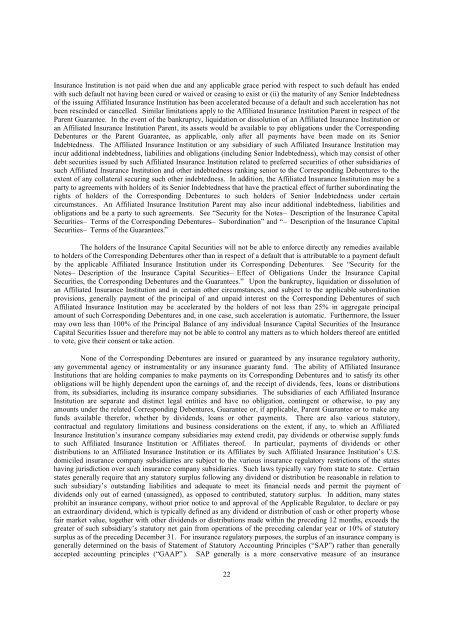MMCapS XVII Final Offering Circular - Irish Stock Exchange
MMCapS XVII Final Offering Circular - Irish Stock Exchange
MMCapS XVII Final Offering Circular - Irish Stock Exchange
Create successful ePaper yourself
Turn your PDF publications into a flip-book with our unique Google optimized e-Paper software.
Insurance Institution is not paid when due and any applicable grace period with respect to such default has ended<br />
with such default not having been cured or waived or ceasing to exist or (ii) the maturity of any Senior Indebtedness<br />
of the issuing Affiliated Insurance Institution has been accelerated because of a default and such acceleration has not<br />
been rescinded or cancelled. Similar limitations apply to the Affiliated Insurance Institution Parent in respect of the<br />
Parent Guarantee. In the event of the bankruptcy, liquidation or dissolution of an Affiliated Insurance Institution or<br />
an Affiliated Insurance Institution Parent, its assets would be available to pay obligations under the Corresponding<br />
Debentures or the Parent Guarantee, as applicable, only after all payments have been made on its Senior<br />
Indebtedness. The Affiliated Insurance Institution or any subsidiary of such Affiliated Insurance Institution may<br />
incur additional indebtedness, liabilities and obligations (including Senior Indebtedness), which may consist of other<br />
debt securities issued by such Affiliated Insurance Institution related to preferred securities of other subsidiaries of<br />
such Affiliated Insurance Institution and other indebtedness ranking senior to the Corresponding Debentures to the<br />
extent of any collateral securing such other indebtedness. In addition, the Affiliated Insurance Institution may be a<br />
party to agreements with holders of its Senior Indebtedness that have the practical effect of further subordinating the<br />
rights of holders of the Corresponding Debentures to such holders of Senior Indebtedness under certain<br />
circumstances. An Affiliated Insurance Institution Parent may also incur additional indebtedness, liabilities and<br />
obligations and be a party to such agreements. See “Security for the Notes— Description of the Insurance Capital<br />
Securities— Terms of the Corresponding Debentures— Subordination” and “—Description of the Insurance Capital<br />
Securities— Terms of the Guarantees.”<br />
The holders of the Insurance Capital Securities will not be able to enforce directly any remedies available<br />
to holders of the Corresponding Debentures other than in respect of a default that is attributable to a payment default<br />
by the applicable Affiliated Insurance Institution under its Corresponding Debentures. See “Security for the<br />
Notes— Description of the Insurance Capital Securities— Effect of Obligations Under the Insurance Capital<br />
Securities, the Corresponding Debentures and the Guarantees.” Upon the bankruptcy, liquidation or dissolution of<br />
an Affiliated Insurance Institution and in certain other circumstances, and subject to the applicable subordination<br />
provisions, generally payment of the principal of and unpaid interest on the Corresponding Debentures of such<br />
Affiliated Insurance Institution may be accelerated by the holders of not less than 25% in aggregate principal<br />
amount of such Corresponding Debentures and, in one case, such acceleration is automatic. Furthermore, the Issuer<br />
may own less than 100% of the Principal Balance of any individual Insurance Capital Securities of the Insurance<br />
Capital Securities Issuer and therefore may not be able to control any matters as to which holders thereof are entitled<br />
to vote, give their consent or take action.<br />
None of the Corresponding Debentures are insured or guaranteed by any insurance regulatory authority,<br />
any governmental agency or instrumentality or any insurance guaranty fund. The ability of Affiliated Insurance<br />
Institutions that are holding companies to make payments on its Corresponding Debentures and to satisfy its other<br />
obligations will be highly dependent upon the earnings of, and the receipt of dividends, fees, loans or distributions<br />
from, its subsidiaries, including its insurance company subsidiaries. The subsidiaries of each Affiliated Insurance<br />
Institution are separate and distinct legal entities and have no obligation, contingent or otherwise, to pay any<br />
amounts under the related Corresponding Debentures, Guarantee or, if applicable, Parent Guarantee or to make any<br />
funds available therefor, whether by dividends, loans or other payments. There are also various statutory,<br />
contractual and regulatory limitations and business considerations on the extent, if any, to which an Affiliated<br />
Insurance Institution’s insurance company subsidiaries may extend credit, pay dividends or otherwise supply funds<br />
to such Affiliated Insurance Institution or Affiliates thereof. In particular, payments of dividends or other<br />
distributions to an Affiliated Insurance Institution or its Affiliates by such Affiliated Insurance Institution’s U.S.<br />
domiciled insurance company subsidiaries are subject to the various insurance regulatory restrictions of the states<br />
having jurisdiction over such insurance company subsidiaries. Such laws typically vary from state to state. Certain<br />
states generally require that any statutory surplus following any dividend or distribution be reasonable in relation to<br />
such subsidiary’s outstanding liabilities and adequate to meet its financial needs and permit the payment of<br />
dividends only out of earned (unassigned), as opposed to contributed, statutory surplus. In addition, many states<br />
prohibit an insurance company, without prior notice to and approval of the Applicable Regulator, to declare or pay<br />
an extraordinary dividend, which is typically defined as any dividend or distribution of cash or other property whose<br />
fair market value, together with other dividends or distributions made within the preceding 12 months, exceeds the<br />
greater of such subsidiary’s statutory net gain from operations of the preceding calendar year or 10% of statutory<br />
surplus as of the preceding December 31. For insurance regulatory purposes, the surplus of an insurance company is<br />
generally determined on the basis of Statement of Statutory Accounting Principles (“SAP”) rather than generally<br />
accepted accounting principles (“GAAP”). SAP generally is a more conservative measure of an insurance<br />
22
















